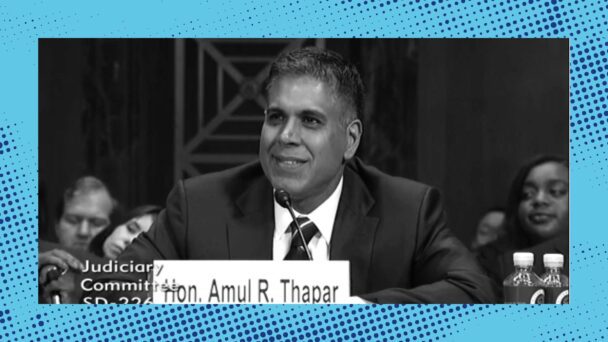For the past three years, Democrats have controlled both the White House and the Senate, thus giving them a monopoly over the constitutionally-prescribed process for nominating and confirming federal judges. For an alarming number of Senate Democrats, however, the urgent task of filling judicial vacancies in states represented by Republican senators is far less important than not doing anything that might make those Republican senators upset.
These curiously-ordered priorities were on full display this week in The New York Times, as Senate Judiciary Committee Chair Dick Durbin touted the recent confirmations of district court nominees in Indiana, South Carolina, and Texas, all of whom made it to the finish line only after earning the blessing of their home-state Republican senators. Durbin has cast these results as evidence that, when it comes to President Joe Biden’s efforts to balance the federal bench, Democrats’ willingness to negotiate with their Republican counterparts is paying valuable dividends. “I think I have convinced the White House that it is better to get a moderate Republican today than a MAGA Republican tomorrow,” Durbin said.
It is of course true that I would prefer moderate Republican nominees to unhinged right-wing Republican nominees, in the same way that I would rather get punched in the face than shot in the head. What’s less clear to me, under a Democratic administration and a Democratic-controlled Senate, and with an election looming that could scramble the balance of power in Washington for the indeterminate future, is why Democrats are still paying this much attention to what Republicans think.

Durbin huddles with fellow Senate Judiciary Democrat Sheldon Whitehouse of Rhode Island, November 2023 (Bill Clark/CQ-Roll Call, Inc via Getty Images)
Durbin’s gee-it-could-be-worse framing is a nod to blue slips, a Senate tradition steeped in Jim Crow-era racism that effectively gives senators veto power over district court nominees in their home states. Blue slips are not a rule, or a law, or anything of the sort; Democrats could dispense with them at any time, a choice that would, for example, allow Durbin to move forward with nominees in Texas without first asking Ted Cruz and John Cornyn for permission. Yet Durbin has stubbornly preserved blue slips for district court nominees, thus putting the Democratic chair of the Senate Judiciary Committee in the odd position of haggling with the Biden administration on behalf of Republicans who cannot believe their good luck.
In the past, Durbin has explained his stance by arguing that Democrats would regret abolishing blue slips if and when Republicans take control of the Senate. But this is less a valuable bit of insight about blue slips than it is a general observation about how elections work: Parties that win elections can and should be expected to use their power to accomplish their goals. Yet for reasons that remain beyond me, Democrats keep allowing the prospect of losing power in the future to deter them from using power in the present. Earlier this week, none other than Ed Whelan heaped praise on Durbin in The National Review, opining that his dedication to blue slips shows that he “understands the Senate far better” than his critics. When the conservative legal movement’s foremost real estate listings detective is loudly, proudly in your corner, it is at least time to consider changing course.
Already, Republicans have abused blue slips to block qualified nominees they simply don’t like. In 2023, Mississippi Senator Cindy Hyde-Smith refused to return her blue slip on Scott Colom, a former prosecutor whose crimes (?) included signing on to a letter condemning transphobic legislation a few years earlier. Durbin described himself as “very disappointed,” but allowed Hyde-Smith to kill the nomination. In 2022, Wisconsin Senator Ron Johnson pulled his blue slip on a nominee whom he recommended to the White House, on grounds that, even in Ron Johnson-adjusted terms, are too stupid to detail here. Durbin again expressed that he was “disappointed” in his colleague, and again canceled the hearing.
Meanwhile, when Democrats aren’t in power, they are far less skilled at wielding blue slips than they imagine. Blue slips used to apply to appeals court nominees, too, but Republicans abolished it in the early days of the Trump administration, clearing the way for the confirmations of some of the federal judiciary’s most strident culture warriors in states with two Democratic senators. In 2020, the Senate confirmed a pair of anti-choice district court judges in—get this—Durbin’s home state of Illinois, after he and Senator Tammy Duckworth struck a deal that allowed them to pick one of four judges as part of a compromise package. To the extent that preserving blue slips is supposed to be insurance against losses of power, Durbin should be acutely aware how worthless the policy can be.

Senators Lindsey Graham and Chuck Grassley at a Senate Judiciary Committee hearing, May 2023 (Tom Williams/CQ-Roll Call, Inc via Getty Images)
The notion that future Republican Senate majorities will reciprocate Durbin’s gesture here is also sort of belied by, well, everything previous Republican Senate majorities have done over the past decade-plus when the stakes were high enough. Filling vacant Supreme Court seats was essential Senate business, until Mitch McConnell realized he could take his chances on the 2016 election, and then it wasn’t. Preserving the filibuster for Supreme Court nominees was sacrosanct, until it prevented McConnell from putting Neil Gorsuch in Scalia’s seat, and then it wasn’t. The Scalia Rule was a vital principle of representative democracy, until Ruth Bader Ginsburg’s unexpected death gave McConnell the chance to create a six-justice conservative supermajority days before the 2020 election, and then it wasn’t. The animating force in judicial politics is power, not comity. Republicans understand this. Democrats do not.
During the first two years of the Biden administration, the White House was (deservedly) praised for the rapid pace of judicial confirmations. But most of that was low-hanging fruit— vacancies in states with two Democratic senators, where Republicans were able to do little besides cast nay votes. Today, about half of vacancies are district court judgeships in states with at least one Republican senator, which means that for as long as Durbin allows unreturned blue slips to kill nominations, Democrats will be squandering the power voters entrusted to them. Their legacy is not just about how many confirmation fights they win; it is also about how many they lose because they kept a hand tied behind their back.




